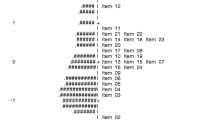Abstract
In a large-scale longitudinal study, 11-year-old schoolchildren were given a control-of-variables task, and their scores in this were related to their progress in learning about science at school over the next 3 years. The aim of the control-of-variables task was to measure children’s understanding that in a properly controlled scientific comparison one variable is tested at a time, while other variables are held constant. There were 2 kinds of question in the task. In one, the pupils were asked to judge whether particular comparisons between 2 situations were valid ones, in which all variables apart from the one being tested were held constant. In the other, they were asked to set up a valid comparison themselves. The pupils’ scores for both kinds of item successfully predicted their progress in science at school later on, even after controls for the effects of differences in age and IQ. Their success in setting up valid comparisons was a better predictor in the long term than the choices that they made in judging whether given comparisons were valid or not.
Similar content being viewed by others
References
Anderson, L. W., Krathwohl, D. R., Airasian, P. W., Cruikshank, K. A., Mayer, R. E., Pintrich, P. R., Raths, J. & Wittrock, M. C. (2000). A taxonomy for learning, teaching, and assessing: A revision of Bloom's taxonomy of educational objectives. New York: Pearson, Allyn & Bacon.
Bitner, B. L. (1991). Formal operational reasoning modes: Predictors of critical thinking abilities and grades assigned by teachers in science and mathematics for students in grades nine through twelve. Journal of Research in Science Teaching, 28, 265–274.
Bloom, B. S. (1956). Taxonomy of educational objectives, handbook I: The cognitive domain. New York: David McKay.
Bullock, M., Sodian, B. & Koerber, S. (2009). Doing experiments and understanding science: Development of scientific reasoning from childhood to adulthood. In W. Schneider & M. Bullock (Eds.), Human development from early childhood to early adulthood. Findings from the Munich Longitudinal Study (pp. pp. 173–197). Mahwah, NJ: Lawrence Erlbaum.
Bullock, M. & Ziegler, A. (1999). Scientific reasoning: Developmental and individual differences. In F. E. Weinert & W. Schneider (Eds.), Individual development from 3 to 12 (pp. 38–54). Cambridge: Cambridge University Press.
Chen, Z. & Klahr, D. (1999). All other things being equal: Acquisition and transfer of the control of variables strategy. Child Development, 70, 1098–1120.
Inhelder, B. & Piaget, J. (1958). The growth of logical thinking from childhood to adolescence. New York: Basic Books.
Kanari, Z. & Millar, R. (2004). Reasoning from data: How students collect and interpret data in science investigations. Journal of Research in Science Teaching, 41, 748–769.
Klahr, D., Fay, A. & Dunbar, K. (1993). Heuristics for scientific experimentation: A developmental study. Cognitive Psychology, 25, 111–146.
Krathwohl, D. R. (2002). A revision of Bloom's taxonomy: An overview. Theory into Practice, 41(4), 212–264.
Kuhn, D. (2011). What is scientific reasoning and how does it develop? In U. Goswami (Ed.), Child cognitive development (2nd ed., pp. 497–523). Oxford: Blackwell.
Kuhn, D., Amsel, E. & O'Loughlin, M. (1988). The development of scientific thinking. New York: Academic.
Lawson, A. E. (1978). The development and validation of a classroom test of formal reasoning. Journal of Research in Science Teaching, 15, 11–24.
Lawson, A. E. (1983). Predicting science achievement: The role of developmental level, disembedding ability, mental capacity, prior knowledge and beliefs. Journal of Research in Science Teaching, 20, 117–129.
Nunes, T. & Bryant, P. (2003). Mathematical and scientific thinking. In A. Grayson & J. Oates (Eds.), Cognition and language development in children (pp. 242–278). Milton Keynes, Bucks: Open University Press.
Shayer, M. (1999). Cognitive acceleration through science education II: Its effects and scope. International Journal of Science Education, 21, 883–902.
Shayer, M. & Adey, P. S. (1993). Accelerating the development of formal thinking in middle and high school students IV: Three years on after a two-year intervention. Journal of Research in Science Teaching, 30, 351–366.
Strand-Cary, M. & Klahr, D. (2008). Developing elementary science skills: Instructional effectiveness and path independence. Cognitive Development, 23, 488–511.
Wechsler, D. (1992). WISC-III UK manual. Sidcup, Kent: The Psychological Corporation, Harcourt Brace Jovanovich.
Zimmerman, C. (2000). The development of scientific reasoning skills. Developmental Review, 20, 99–149.
Zimmerman, C. (2007). The development of scientific thinking skills in elementary and middle school. Developmental Review, 27, 172–223.
Author information
Authors and Affiliations
Corresponding author
Electronic supplementary material
Below is the link to the electronic supplementary material.
ESM 1
(DOCX 19 kb)
Rights and permissions
About this article
Cite this article
Bryant, P., Nunes, T., Hillier, J. et al. THE IMPORTANCE OF BEING ABLE TO DEAL WITH VARIABLES IN LEARNING SCIENCE. Int J of Sci and Math Educ 13 (Suppl 1), 145–163 (2015). https://doi.org/10.1007/s10763-013-9469-x
Received:
Accepted:
Published:
Issue Date:
DOI: https://doi.org/10.1007/s10763-013-9469-x




